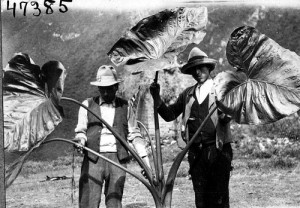- More either-or stuff from the Guardian on the Indian GM brijal story.
- The USDA prickly pear cactus germplasm collection gets some exposure. And how many times can one say that.
- Much better title from Discover on that ancient northern Amazonian earthworks story.
- Kenyan foresters tell people to eat bamboo. Luigi’s mother-in-law politely demurs. On the other hand, she might like this.
- Swiflet farming? Swiflet farming.
- Really heated exchange on paper on coconut lethal yellowing in Yucatan develops on Google Groups. I love the internet.
- PROTA publishes expensive book on promising African plants. Promises, promises. NASA promised us the personal jetpack. Where are we with that?
- Nice summary of that Mesoamerican agricultural origins story we blogged briefly about a few days ago. So what exactly do you call hunter-gatherers who also grow crops?
- First International Symposium on Wild Relatives of Subtropical and Temperate Fruit and Nut Crops will be held March 19-23, 2011 in Davis, California on the campus of the University of California, Davis. Book early.
Historical photographs of Peru botanical expedition online
The Field Museum joined Flickr Commons in April 2009, inviting the public to help describe a selection of our historic photographs.
And that includes some incredible photos from botanist J. Francis MacBride’s expeditions to Peru in 1922 and 1923. Like this one, for example.
There’s some agrobiodiversity in there. If you can help out with describing any of the photos, leave a comment on its Flickr page.
Nibbles: Biocultural diversity, Maasai, Organics, Amazon ag
- IUCN publishes “Biocultural Diversity Conservation, a Global Sourcebook.”
- And here’s an example of the application of the above, I suppose.
- UNEP looks to boost organic farming in Eastern Europe and the Caucasus.
- Why don’t they just import organics from West Africa, like the rest of Europe?
- Wired does history of ag in Amazonia.
Nibbles: Asses, Mapping pathogens, Oysters, Tea, Turkish biodiversity hotspot, Dolmades and sage, Yams festival, Pollen video, Agriculture and mitigation, Rarity, School feeding, Sheep
- Jeremy probes into wild asses at Vaviblog.
- Mapping the evolution of pathogens. And in kinda related news…
- The European oyster needs diversity. Well, natch.
- The tree forests of Yunnan, and, concidentally, the story of how the secret of their product got out.
- The Kaçkar Mountains at Yusufeli, northeast Turkey are in trouble. Any crop wild relatives there, among the bears and other charismatic megafauna?
- Speaking of Turkey, here’s how to make one of its delicacies. But hey, if you don’t have vine leaves, you can use this.
- Having fun with yams.
- Drori does pollen.
- FAO’s Mitigation of Climate Change in Agriculture (MICCA) Project. Any agrobiodiversity-related stuff? Need to explore…
- “…conserving species may only require specific activities, such as collect and distributing seeds.”
- African school feeding programme uses “local” products. What would Paarlberg say? You can find out here, if you have 90 minutes to spare.
- British boffins breed self-shearing sheep. No, really.
Nibbles: Carnival, Fish, Roman nutrition
- Blog Carnival Scientia pro Publica latest is up
- And that’s where we found Ignorance is fish. Japan hooked.
- Romans had too little milk and coeliac disease to boot.
